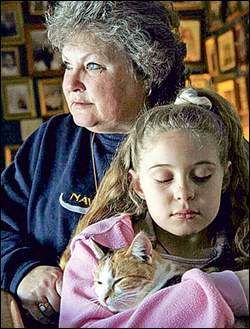This really poses a problem for people like this grandmother caring for her deceased daughter’s nine-year old daughter. The $100,000 death benefit and the $400,000 life insurance will only go to the daughter when she is grown.
Family Struggles after Death in Iraq
WASHINGTON – Her daughter was killed by a bomb in Iraq. Eight months later, Susan Jaenke is both grief-stricken and strapped-behind on her mortgage, backed up on her bills and shut out of the $100,000 government death benefit that her daughter thought she had left her.
The problem is that Jaenke is not a wife, not a husband, but instead grandmother to the 9-year-old her daughter left behind. “Grandparents,” she said, “are forgotten in this.”

LINDA DAVIDSON/THE WASHINGTON POST
Susan Jaenke, left, has struggled to make ends meet since she took over care for Kayla, whose mother was killed in Iraq.
For the Jaenkes of Iowa Falls, Iowa, and others like them, the toll of war can be especially complex: They face not only the anguish of losing a son or daughter but also the emotional, legal and financial difficulties of putting the pieces back together for a surviving grandchild.
Hagel and Latham are introducing a bill that would permit the $100,000 to go to the proper guardian.
Jaime S. Jaenke, a Navy construction-battalion medic killed last June in Anbar province, is particularly striking because she was a single parent who clearly meant to assign her mother the benefit. Jaenke, 29, filled in her mother’s name on a form and carefully spelled out her wishes in a letter. But by law, the $100,000 benefit goes first to a spouse or a child. So 9-year-old Kayla Jaenke collects the $100,000-plus $400,000 in life insurance-after she turns 18, leaving Susan Jaenke to ask, “What about the next nine years?”
Has this always been a problem, or has the process changed? In a way it seems logical to make the child wait, but it leaves the person caring for the child without resources.



I don’t know if that’s always been a problem, but that’s a horrendous story. As if the families weren’t under enough stress already.
Obviously the death benefit should go to the primary care giver– in this case the grandparents.
in nine years, the $100,000 will be there for this little girl who lost her mother?
sure.
one possibility: not sure, but it might be possible to borrow money using the insurance benefit as collateral. I wouldn’t bother trying to use the $100K government benefit in this way.